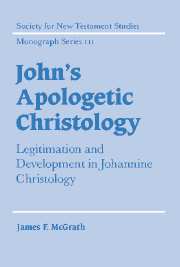Book contents
- Frontmatter
- Contents
- Preface
- Part 1 Introduction
- Part 2 Jesus and God
- 3 Are there ‘two powers’ in John?
- 4 God's equal or God's agent? (John 5)
- 5 ‘I obey, therefore “I am”’ (John 8.12 – 59)
- 6 ‘You are gods’ – but who are ‘you’? (John 10.22 – 39)
- 7 In the bosom of the Father (John 1.1 – 18)
- 8 Conclusion to part 2
- Part 3 Jesus, Moses and Torah
- Part 4 Other issues and conclusion
- 16 Conclusion
- Bibliography
- Index of biblical references
- Index of authors
- Index of subjects
7 - In the bosom of the Father (John 1.1 – 18)
Published online by Cambridge University Press: 22 September 2009
- Frontmatter
- Contents
- Preface
- Part 1 Introduction
- Part 2 Jesus and God
- 3 Are there ‘two powers’ in John?
- 4 God's equal or God's agent? (John 5)
- 5 ‘I obey, therefore “I am”’ (John 8.12 – 59)
- 6 ‘You are gods’ – but who are ‘you’? (John 10.22 – 39)
- 7 In the bosom of the Father (John 1.1 – 18)
- 8 Conclusion to part 2
- Part 3 Jesus, Moses and Torah
- Part 4 Other issues and conclusion
- 16 Conclusion
- Bibliography
- Index of biblical references
- Index of authors
- Index of subjects
Summary
This part of our study would not be complete without a consideration of the prologue, since, as we have already stressed, the Evangelist intended the whole of his work to be read in light of it. We have left it until last not due to any literary considerations, but because the evidence of controversy over Christology is much less explicit here than in the other passages we have considered.
Nonetheless, a number of recent studies have emphasized that the conflicts and issues which are present in the rest of the Gospel are also reflected in the prologue. For example, as Kysar notes, light/darkness dualism is found in the prologue, symbolizing the acceptance and rejection of the Logos, which also runs throughout the Gospel and which is found in several of the conflict passages we have singled out for consideration in this book. Closely connected with this is the prologue's polemical tone, emphasizing the Logos as the true (άληθινόν) light, and Jesus as the unique (μονογενής) Son of God. This, Kysar suggests, reflects ‘a community under attack’. This polemic Kysar connects with the issue of the revelations brought by Jesus and Moses. Carter, however, also seeks to relate the prologue to the conflict we have been considering in this chapter, that of the relationship between Jesus and God. This is a conclusion which we have already hinted at, and which we shall seek to demonstrate in the present chapter.
- Type
- Chapter
- Information
- John's Apologetic ChristologyLegitimation and Development in Johannine Christology, pp. 131 - 144Publisher: Cambridge University PressPrint publication year: 2001

